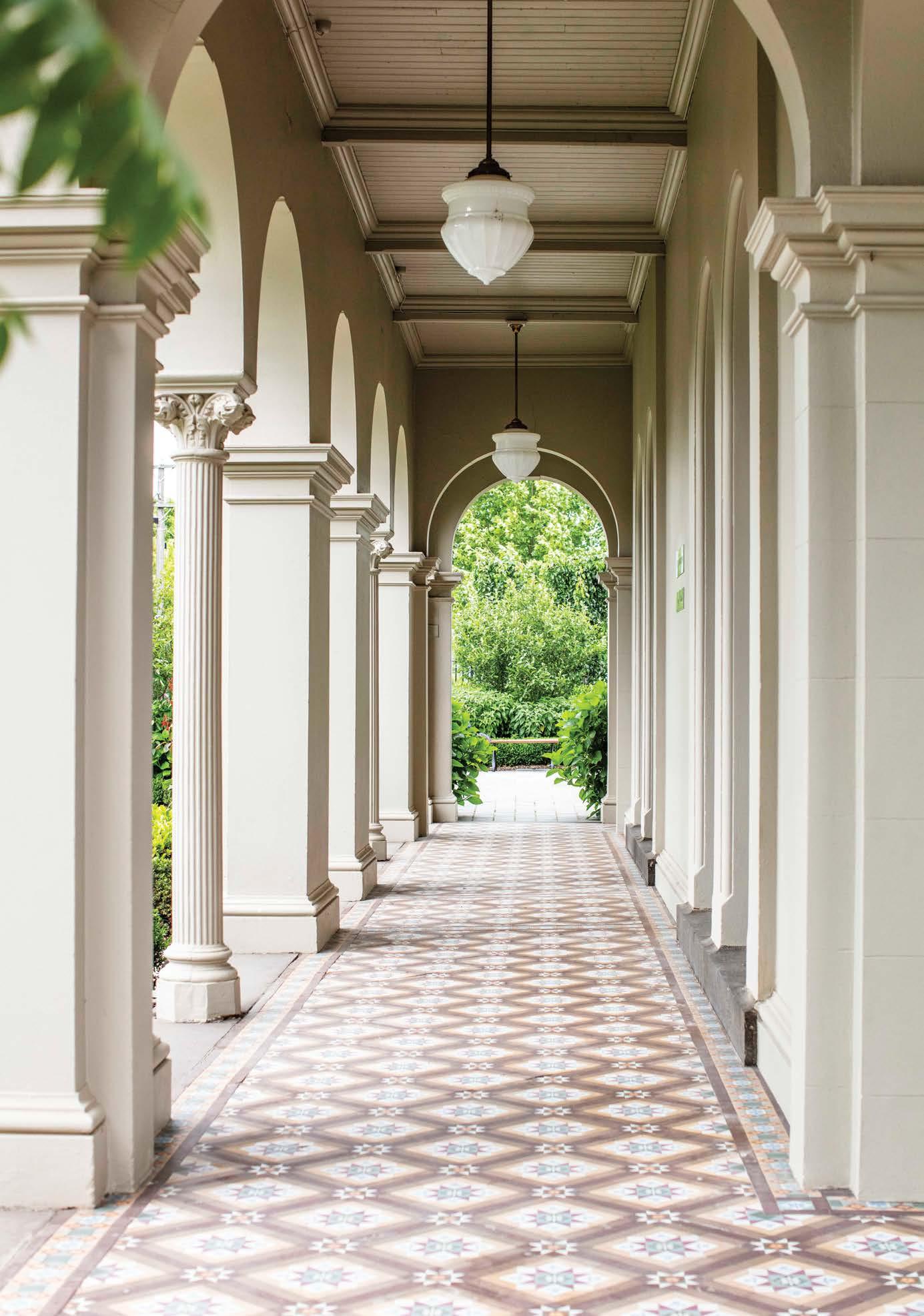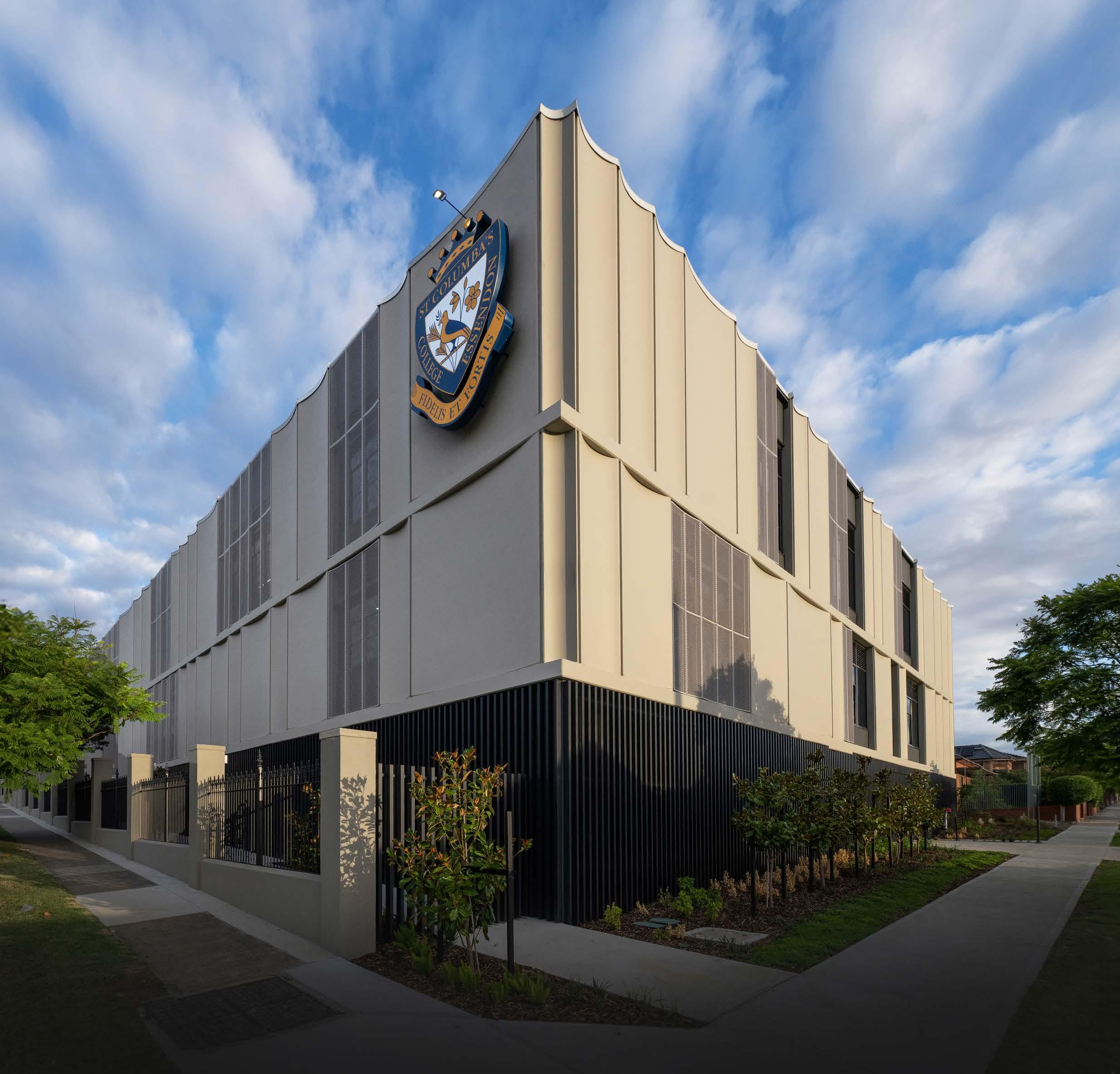

COLLEGE HANDBOOK
Welcome
TO ST COLUMBA’S
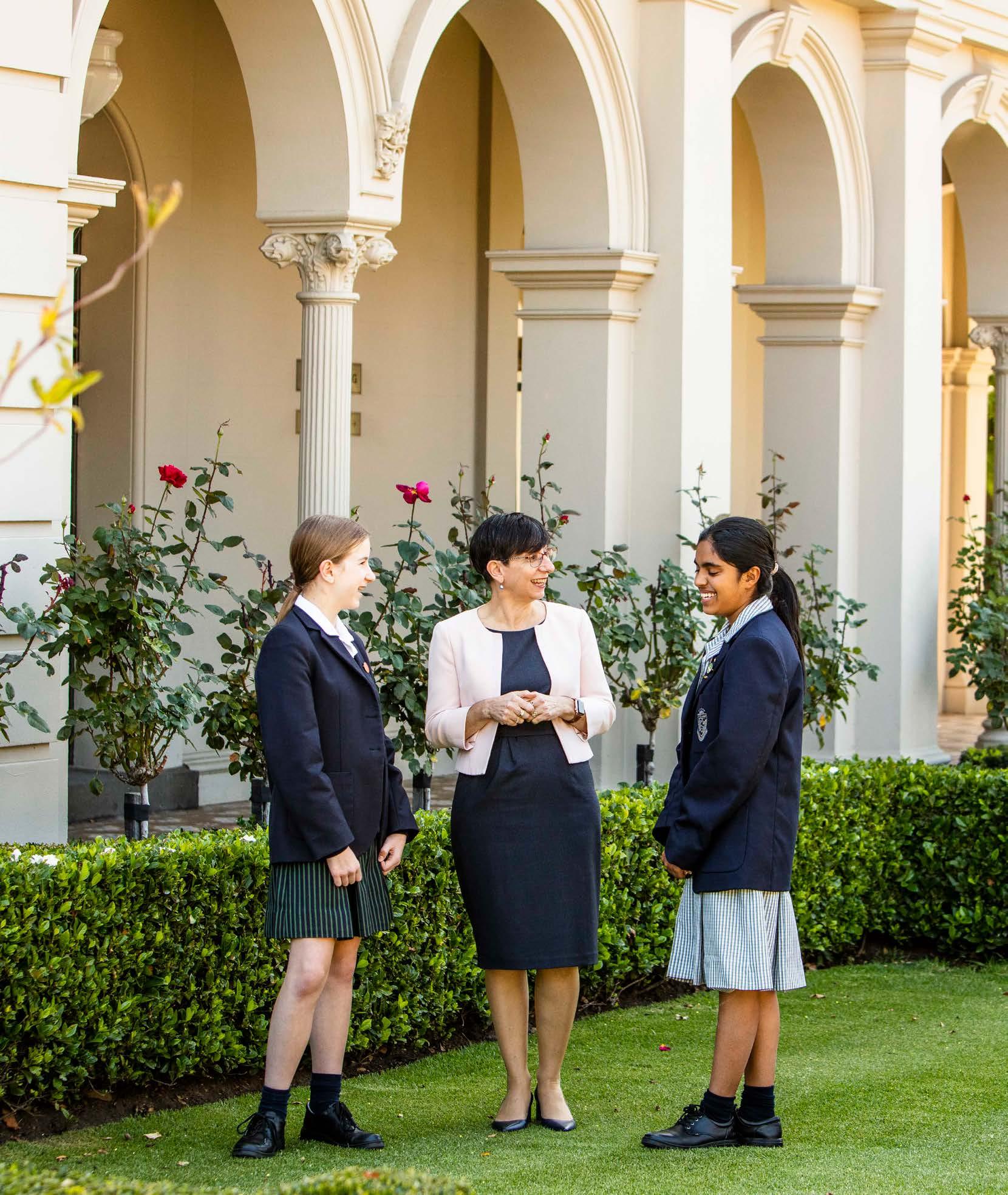
WELCOME
St Columba’s College is a welcoming and vibrant Catholic learning community with a rich history in the Essendon area.
Since 1897, the College has provided a quality secondary education for young women that is contemporary and innovative, recognising that we educate girls for futures we can only begin to imagine.
St Columba’s College prides itself on offering a high-quality learning environment for our students. Our learning spaces are places of discovery and experimentation, where each student learns to be an independent, committed and joyful learner. Our hope is that each student will revel in the challenges and opportunities that are offered to them throughout their time at St Columba’s College.
Our history contributes to the rich tapestry of the Sisters of Charity story; a story that is characterised by an unbroken chain of women of vision, courage, strength, tenacity and faithfulness. Students are welcomed into a family of women who sought creative and compassionate solutions to the complex challenges of their times. Our girls are encouraged to recognise and develop their own gifts as contributing community members, who will have a voice to challenge the new issues of our contemporary lives. Our girls are taught to think, create, contribute and agitate as we seek to build societies where justice, hope, compassion and love are the hallmarks.
As this handbook has been designed to help parents and students become familiar with the operations of the College, we ask that you read it carefully and store it in a place with easy access, so it can be used as a reference as needed. Additional information is provided via SEQTA (College Intranet).
There is an old Chinese proverb: “Learning is a treasure that will follow its owner everywhere.”
With this in mind, we welcome you to St Columba’s College – a place full of amazing opportunities and creative experiences to help each student grow into the person God created them to be.
This prospectus is your introduction to the St Columba’s community. Along with the College website, it provides a snapshot of who we are and what we can offer your daughter. I encourage you to use the website to book a College tour to experience firsthand the education we proudly proclaim as exemplary for young women in the Essendon area. I look forward to welcoming you on one of our tours.
We hope St Columba’s will be:
• A place of welcome and support
• A place of great learning, achievement and excitement
• A place where students form strong friendship
• A place where each student feels valued and treasured
• A place of belonging, courage and compassion.
Rita Grima PRINCIPAL

St Columba’s College was founded in 1897, by Mother Ursula Bruton, a Sister of Charity. Named after the Irish Saint and scholar, Saint Columba, the College was founded as a way for girls in the Essendon area to continue their education past primary school.
Since its opening on July 13, 1897, St Columba’s has grown to educate over a thousand students each year, offering a broad range of curricular and cocurricular activities, whilst continuing to live the message of Mary Aikenhead and the Sisters of Charity.
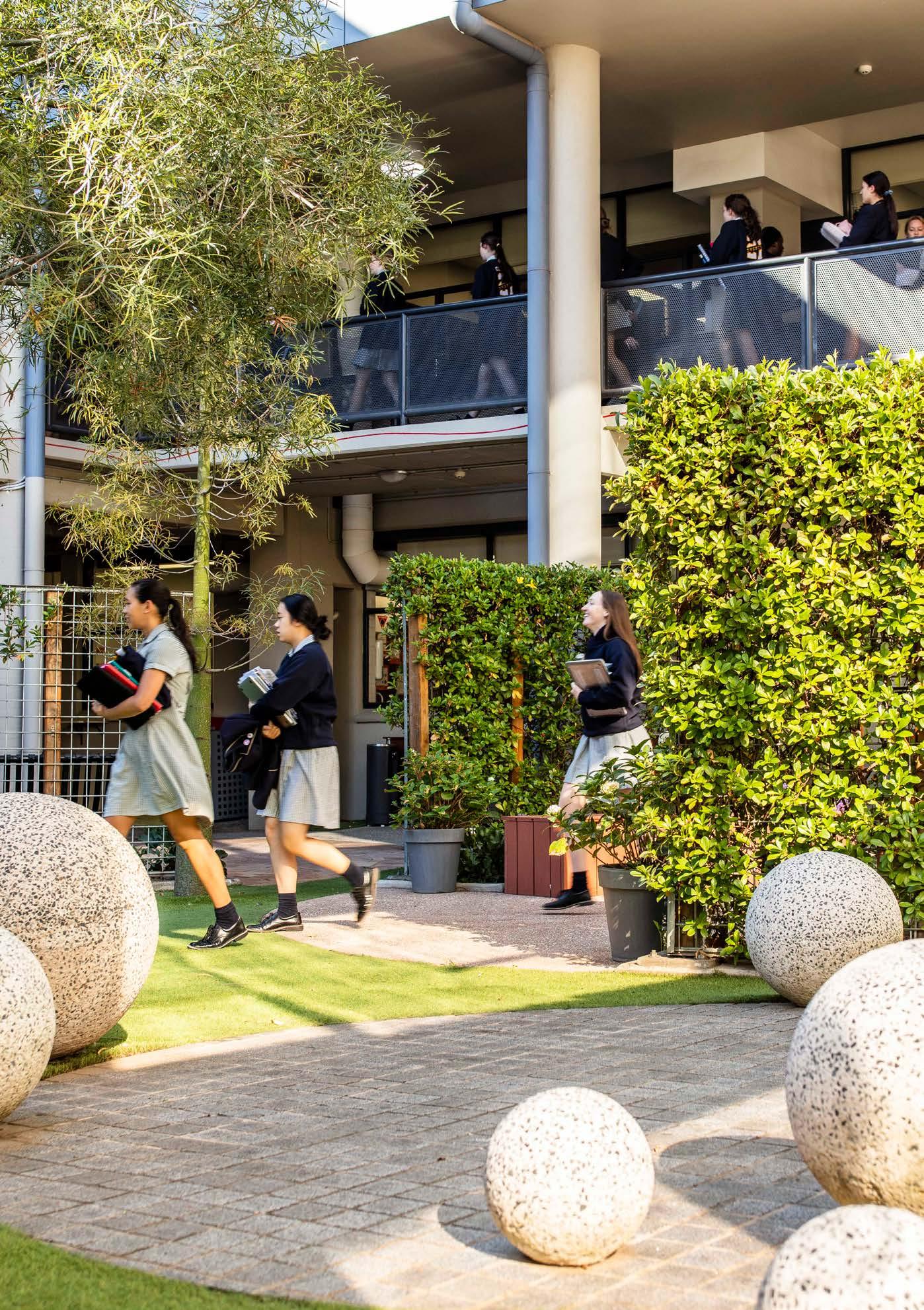

WHO WAS MARY AIKENHEAD?
St Columba’s College is governed by Mary Aikenhead Ministries, named for Mary Aikenhead, the founder of the Sisters of Charity.
Mary Aikenhead was born in 1787 in Cork, Ireland to an upper-class family. Mary’s father was a doctor, who worked with the poor. Mary was deeply affected by the widespread unemployment and poverty experienced by her father’s patients and those on the streets around her. Converting to Catholicism, she answered the call from God to make a difference in the lives of those less fortunate. As a response to this call, Mary established the Sisters of Charity.
Formally recognised in 1816, the Sisters began helping the poor and sick, caring for orphans, visiting prisoners in jail, and creating a system of schools for poor children. In 1837, Mary was asked to send some of her Sisters to Australia to work with female convicts. Five Sisters volunteered, arriving in Australia on December 31, 1838.
In the years after their arrival, the Sisters set up hospitals and schools, continuing their response to God’s call to help the poor, sick, unemployed and marginalised in our society –a mission that continues today.
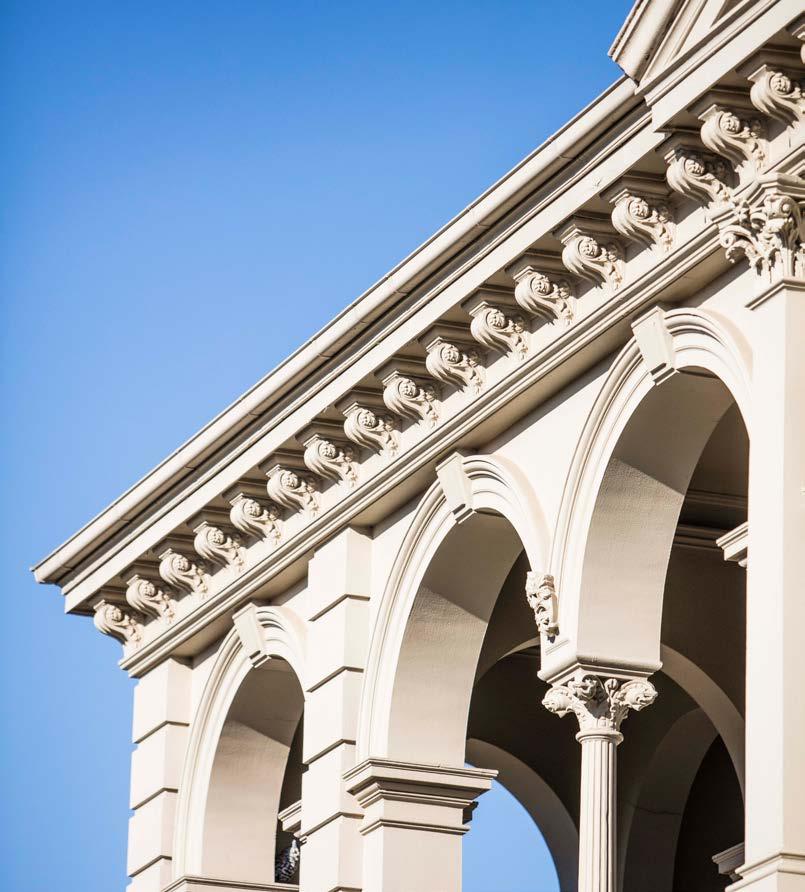
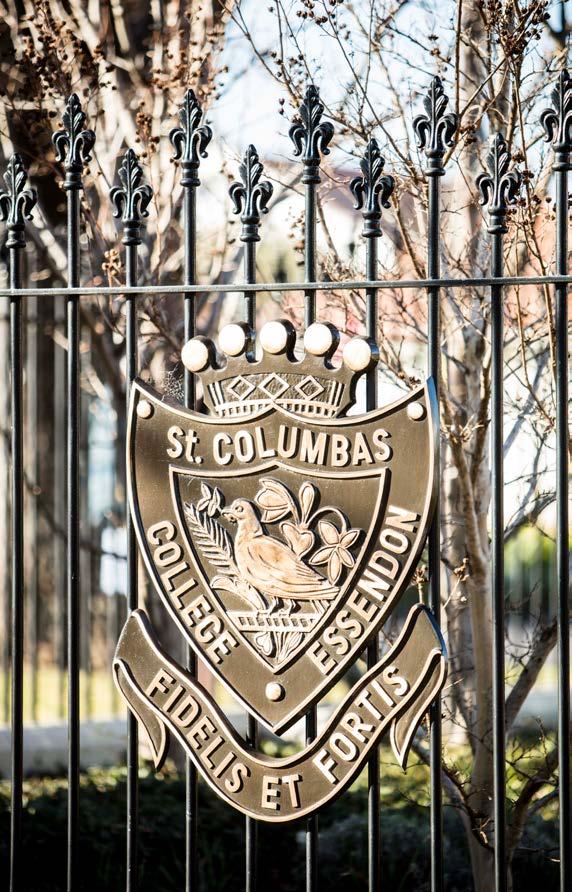
WHO WAS SAINT COLUMBA?
Saint Columba (521–597) was an Irish monk and priest who travelled around Ireland and Scotland, teaching people about the word of God.
Named for the ‘Church dove’, Columba studied under many prominent church leaders, learning as much as he could about God’s work. Columba also created beautiful manuscripts, however, when he was accused of copying another missionary’s manuscript, a battle ensued, killing many. As a result of this battle, Saint Columba was exiled to the Scottish island of Iona, building a monastery to continue spreading the word of God.
Today, Iona is a place of pilgrimage for many Christians, who visit the island to rest and learn the teachings of God, just like Saint Columba did.
OUR VALUES
St Columba’s College is committed to the values of Love, Compassion, Hope, Justice and Truth.
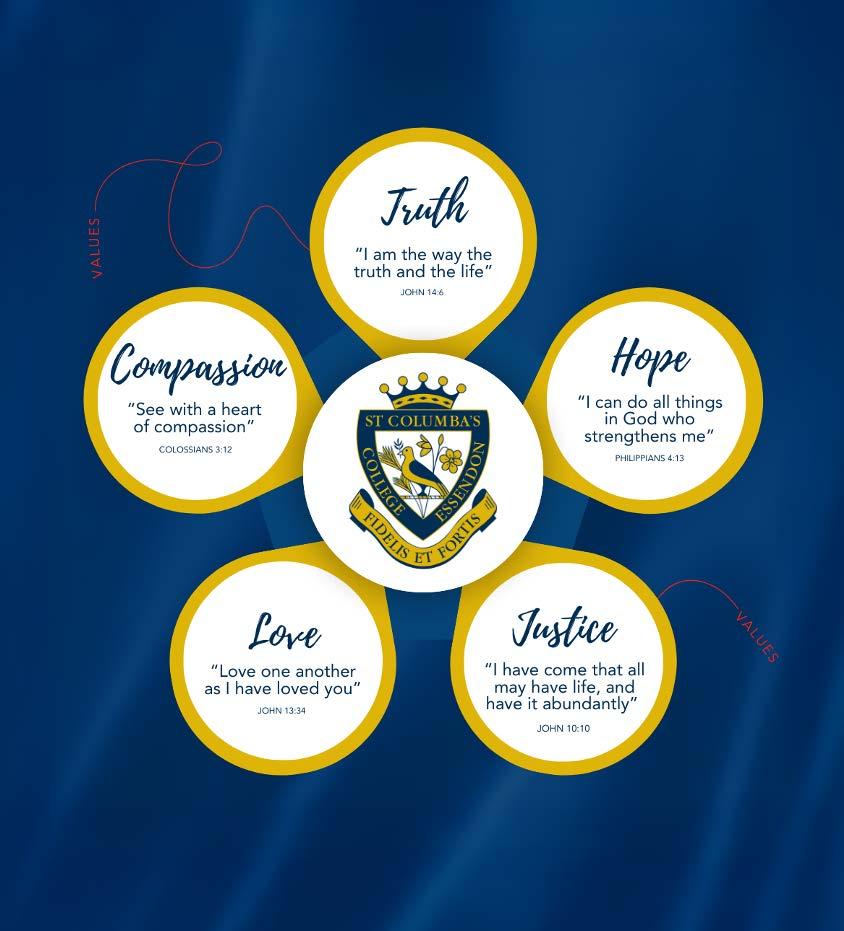
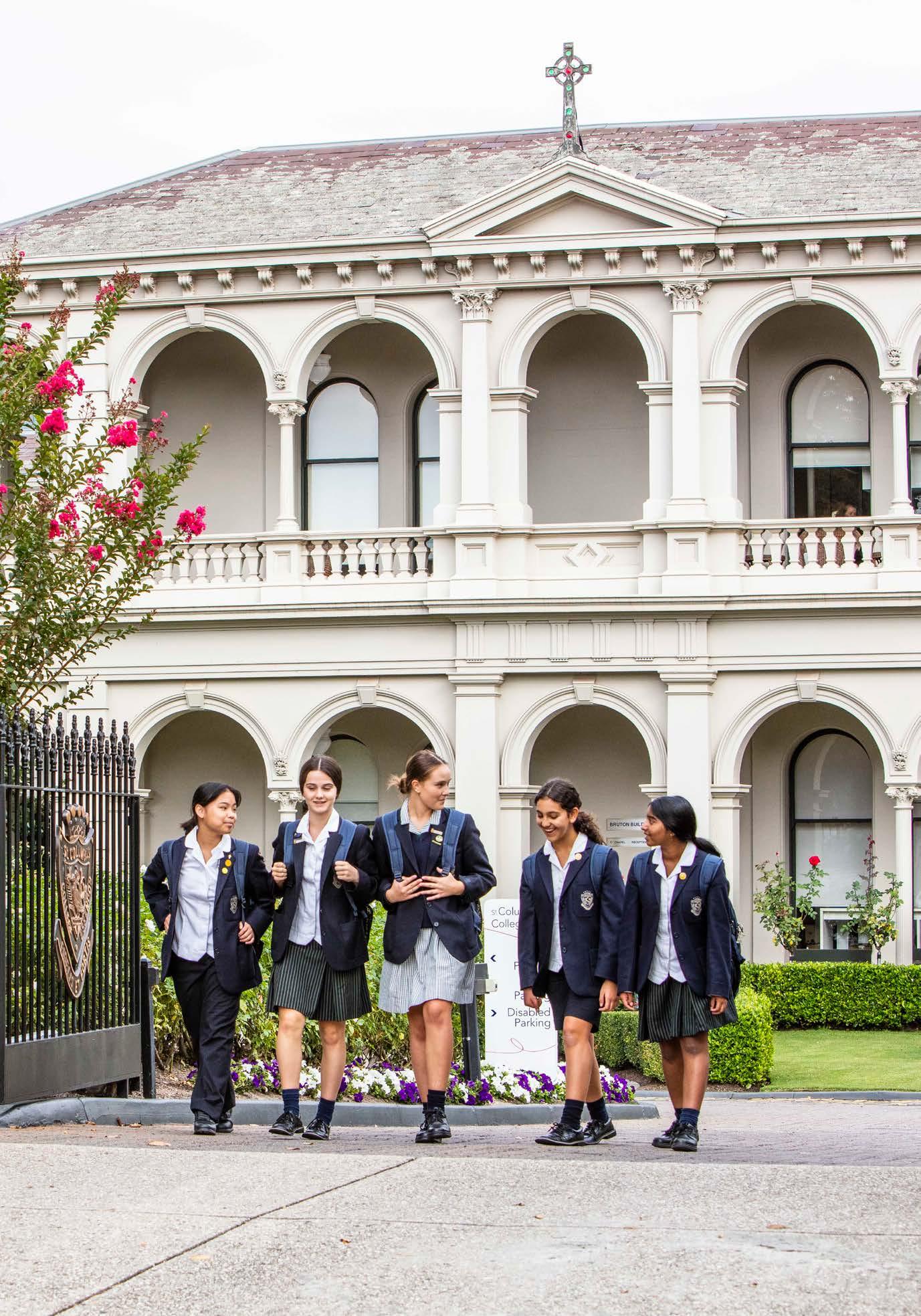
St Columba’s College is committed to the holistic development of students — intellectually, physically, emotionally, morally, socially, and spiritually.
Student wellbeing is central to everything the College does. Support is offered through programs that focus on resilience, healthy relationships, and personal growth, delivered through Pastoral Care, Religious Education, Health and Physical Education, and CoCurricular activities.
RESTORATIVE PRACTICES
St Columba’s College uses the principles of Restorative Practices to manage student behaviour. These practices promote resilience and foster positive relationships within the school community. The goal is to help students become aware of how their actions affect others through personal accountability and learning during times of conflict.
A key element of Restorative Practices is restoring relationships. This involves developing students’ capacity for empathy and understanding the consequences of their actions—not just for themselves, but for the broader community.
TRANSITION
The transition to secondary school brings many new and exciting experiences for students. They will be learning new subjects, meeting new friends, and building relationships with their teachers. Open and honest conversations with family and teachers are encouraged throughout this period.
Developing a timetable may help students manage the balance between school, sport, social activities, family life, and study. Clear scheduling of these activities supports students in meeting their school and personal commitments.
FIRST AID
The College provides first aid to students who become unwell or are injured during school hours. Students may be sent to Student Reception, where the College Nurse will care for them and arrange for a parent or carer to collect them if needed.
To ensure the best care can be provided, families must keep all medical and emergency information up to date via Consent2Go. Support is available to assist families in using this platform by contacting College Reception.
ATTENDANCE
Students are expected to maintain an attendance rate above 90% to gain the most from their learning experiences. According to the Victorian Government’s “Every Day Counts” campaign, students with high attendance tend to achieve better academic outcomes.
If a student is late or absent, parents must notify the College via SEQTA Engage using the Absences tab and provide a reason in the information box.
Extended absences, such as family holidays, should ideally be scheduled during school breaks to minimise the impact on learning. When extended absences occur during term time, a Direqt Message (DM) should be sent to the student’s House Leader and Student Reception.
Pastoral Lessons are held every fortnight and focus on the following themes:
• Effective Learners
Students develop key academic skills such as time management, study strategies, exam preparation, and organisational habits.
• Healthy Lifestyle
Lessons encourage physical and mental health, resilience, gratitude practices, and other life skills.
• Making a Difference
Students explore concepts like advocacy, leadership, and feminism, and learn about their House patron’s life and how to contribute to the story of St Columba’s College.
• Healthy Relationships
These sessions teach students about conflict resolution, emotional intelligence, and forming positive relationships.
FRIENDSHIPS
Good friends are those who allow individuals to be themselves and feel supported. For many students, friendships at St Columba’s College may include old friends from primary school as well as new ones made during transition.
Some common scenarios students may encounter include:
“I don’t know anyone in my class”
Students may not be placed in the same class or House Group as their existing friends. This can be a chance to meet new people and later introduce them to old friends. Break times offer plenty of opportunities to reconnect.
“I’m the only person from my primary school — what do I do?”
As all students are new to the College, they begin on equal footing. This common experience makes forming new friendships easier.
Icebreakers for meeting new peers might include:
• Introducing oneself: “Hi, I’m … I’m from St Monica’s Primary School. What primary school did you go to?”
• Asking questions: “Who do you have for Science?” or “What language are you studying?”
• Sitting next to someone new or choosing a new partner for a class project.
• Joining a co-curricular activity to meet others with shared interests.
“My friend went to a different school, and we don’t talk as much. What can I do?”
As students form new interests and friendships, it’s natural for primary school relationships to evolve. If a student feels their friendship is changing, they are encouraged to speak openly with their friend about it. Staff such as House Group Teachers or House Leaders can help facilitate these conversations.
Friendships can often be strengthened by making time to catch up outside of school or inviting friends to meet new peer groups. However, if a friendship does fade, that is also a normal part of growing up. Students will continue to meet new people who share their interests throughout their lives.
St Columba’s College uses a vertical House structure, which plays a significant role in the life of the College. There are seven Houses: Bruton, Cahill, Cater, Cunningham, de Lacy, O’Brien and Williams. Every member of the College community, including students and staff, is assigned to one of these seven Houses.
Each House is divided into three junior and three senior House Groups. The junior House Groups consist of students from Years 7, 8 and 9, while the senior House Groups include students in Years 10, 11 and 12. Students remain in the same House for the duration of their time at the College, and within their House Group for a period of three years.
HOUSE GROUP
House Group takes place for 15 minutes every Monday, Tuesday and Thursday morning. This time allows students to participate in prayer, hear key announcements, and develop strong relationships with their peers and House Group Teacher. The House Group Teacher serves as the student’s primary point of contact and support, providing guidance and advice when needed.
THE HOUSE SYSTEM
Throughout the year, students at St Columba’s College participate in a variety of curriculum-based activities and sporting events where each House competes for points. The House that accumulates the most points by the end of the year is awarded the title of ‘House of the Year’.
Examples of activities students may participate in include:
• Multi-Sports Day
• Athletics Day
• House Partner initiatives
• House Celebration Day
• House stalls on St Columba’s Day
• House Netball Competition
• Participation in sports, Performing Arts ensembles, and other events such as Debating
These events provide students with opportunities to connect with others in their House and to demonstrate pride and engagement within their House and the wider College community.
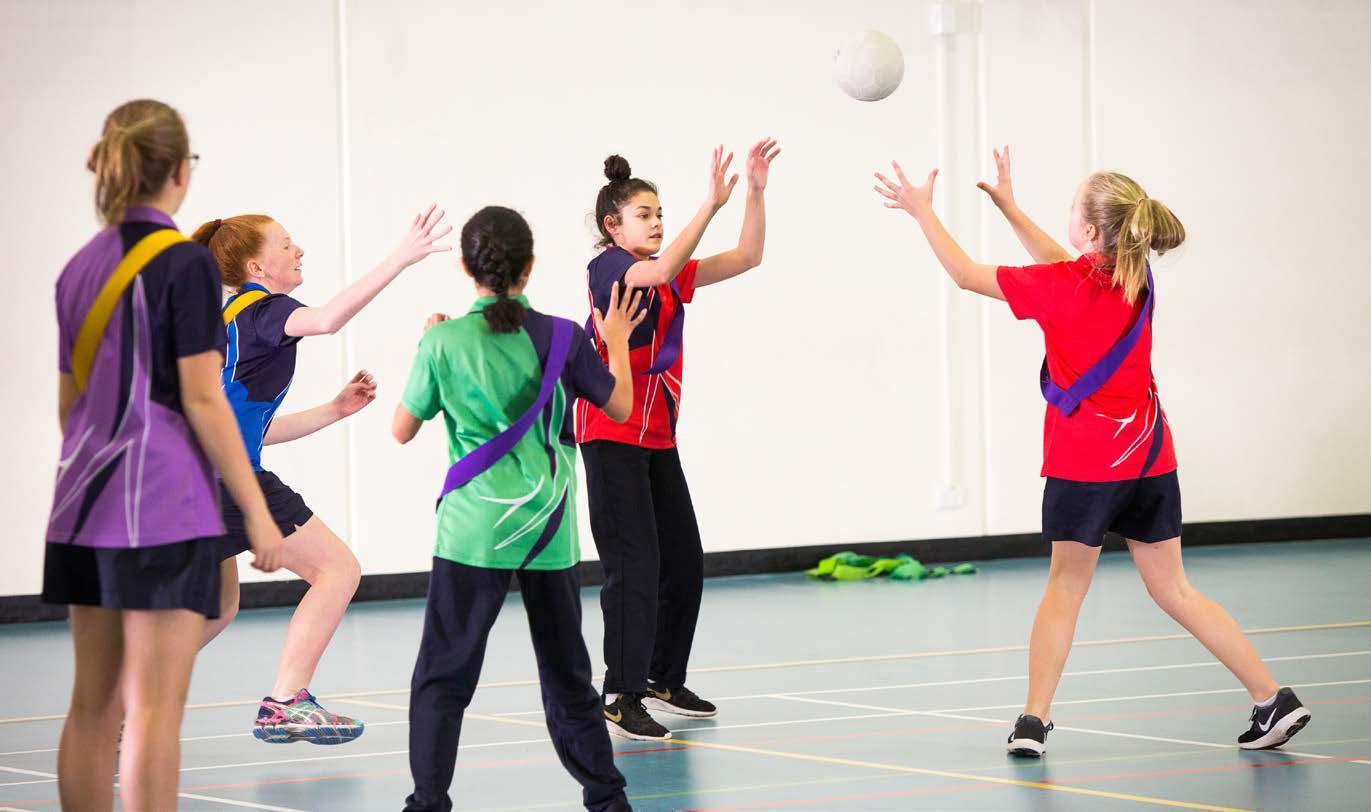
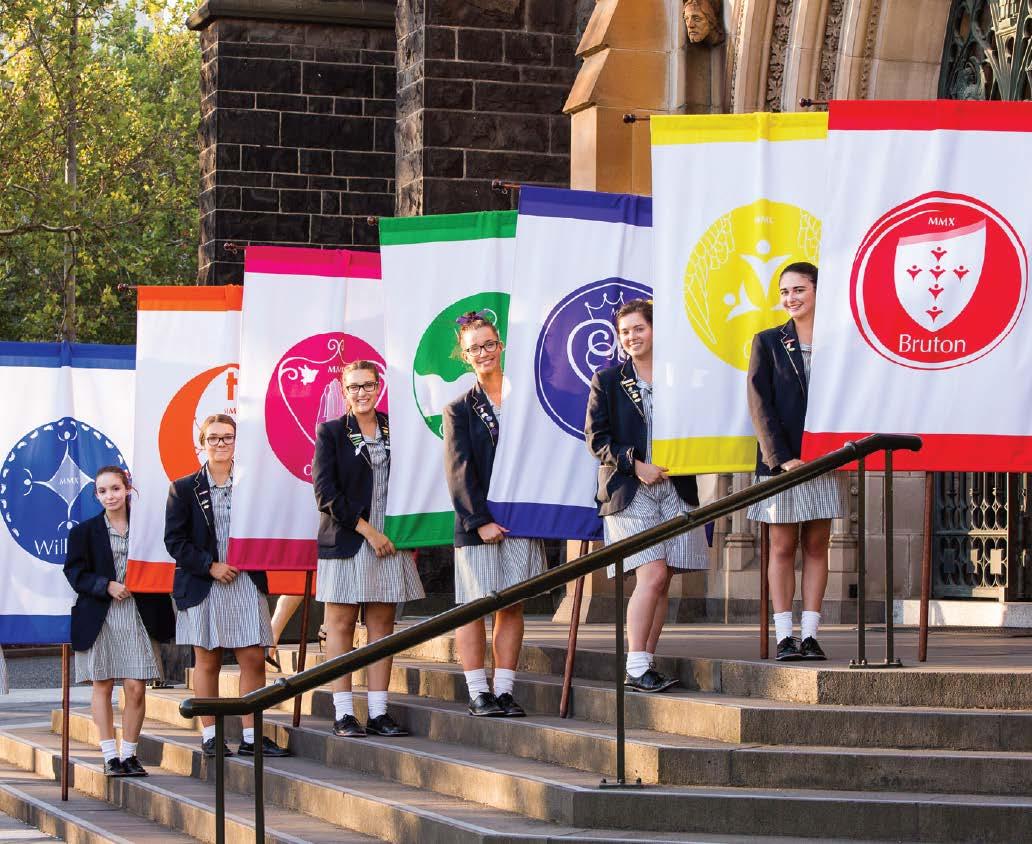
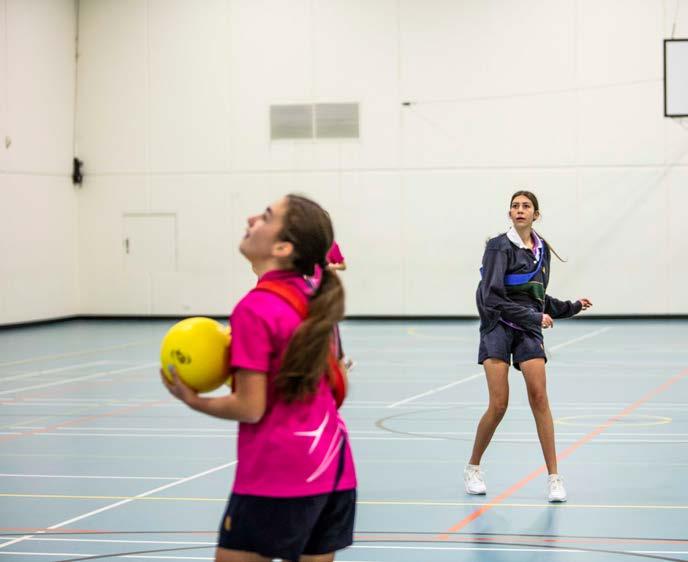
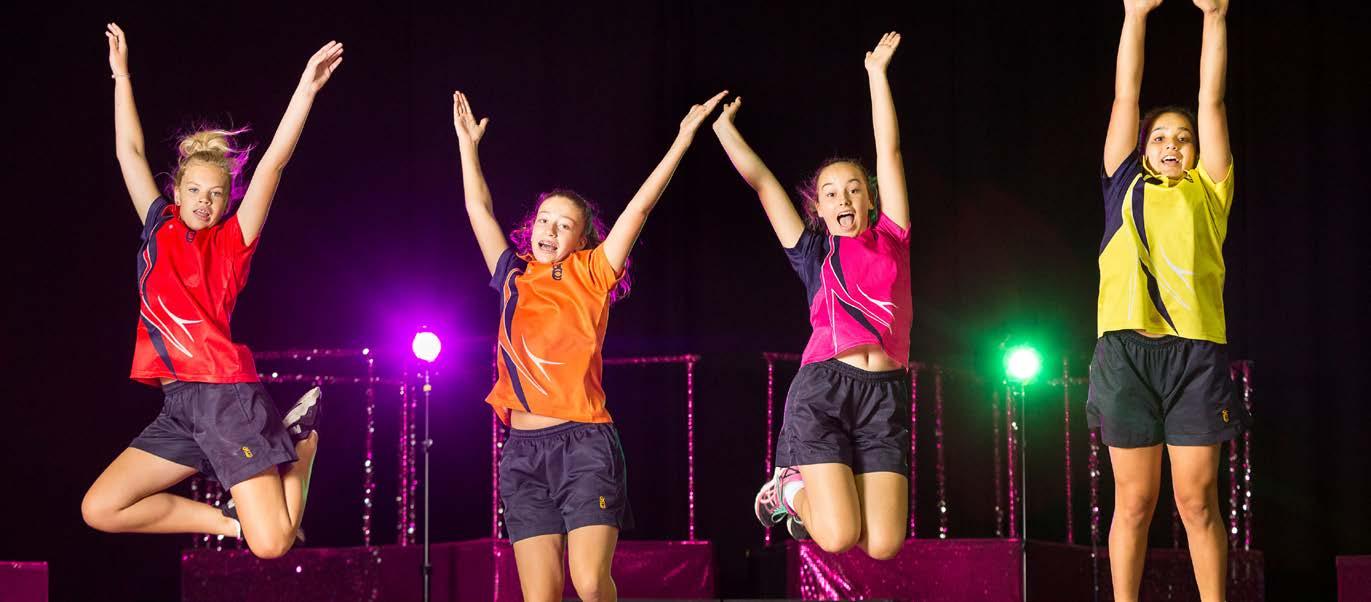
HOUSE EVENTS
BRUTON
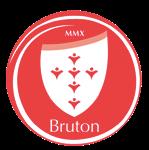
Named for Mother Mary Ursula Bruton, the founder and first Principal of St Columba’s College. Mother Bruton migrated with her family from Ireland to Australia when she was 18, becoming a Sister of Charity in 1882.
CAHILL Named for Sister Mary John Cahill, one of the five Sisters of Charity sent from Ireland to Australia by Mary Aikenhead. Her special ministry was with the prisoners in Parramatta and Hobart.
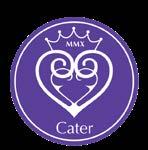
CATER
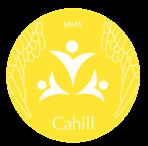
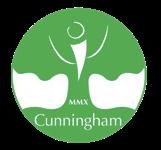
Named for Sister Mary Lawrence Cater, the youngest of the five Sisters of Charity sent to Australia. Sister Cater later became the Head of a school for orphans in Parramatta.
CUNNINGHAM Named for Sister Mary Xavier Cunningham, who grew up in the Windsor area of NSW and was the first Australian to join the Sisters of Charity. Sister Cunningham later became the Matron of St Vincent’s Hospital in Sydney.
DE LACY
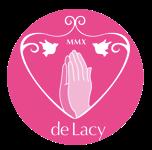
Named for Sister Mary Baptist de Lacy, one of the five Sisters of Charity sent to Australia. Sister de Lacy joined specifically to come to Australia and later founded St Vincent’s Hospital in Sydney.
O’BRIEN Named for Sister Mary de Sales O’Brien, one of the five Sisters of Charity sent to Australia, and ministered in Hobart. Sister O’Brien was sent to Paris by Mary Aikenhead to learn about nursing and hospital management.
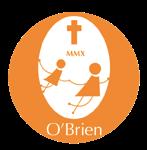
WILLIAMS Named for Sister Mary Xavier Williams, the first Novice to take her Profession of Vows in the Australian Sisters of Charity congregation. Sister Williams went to Hobart in 1847, where she visited gaols, hospitals and the homes of the poor.
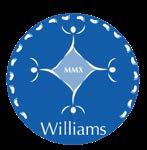
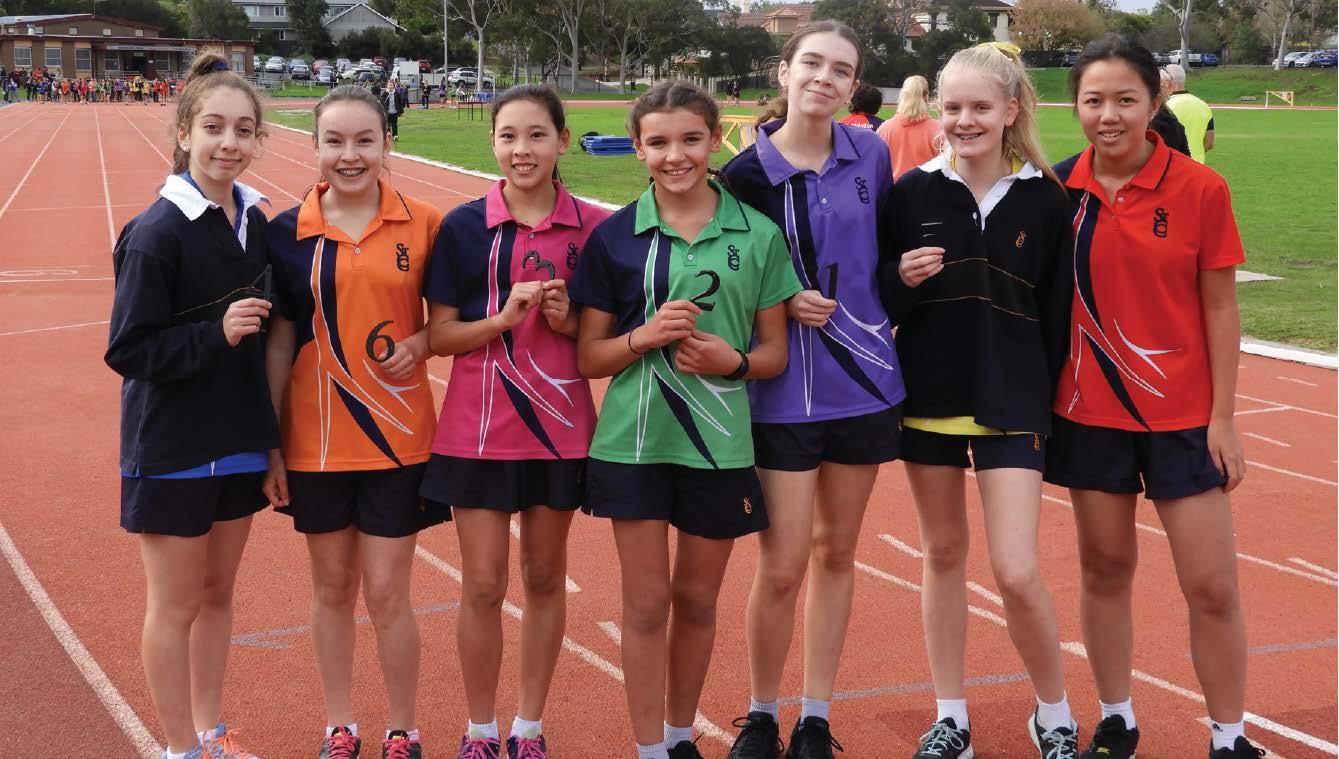
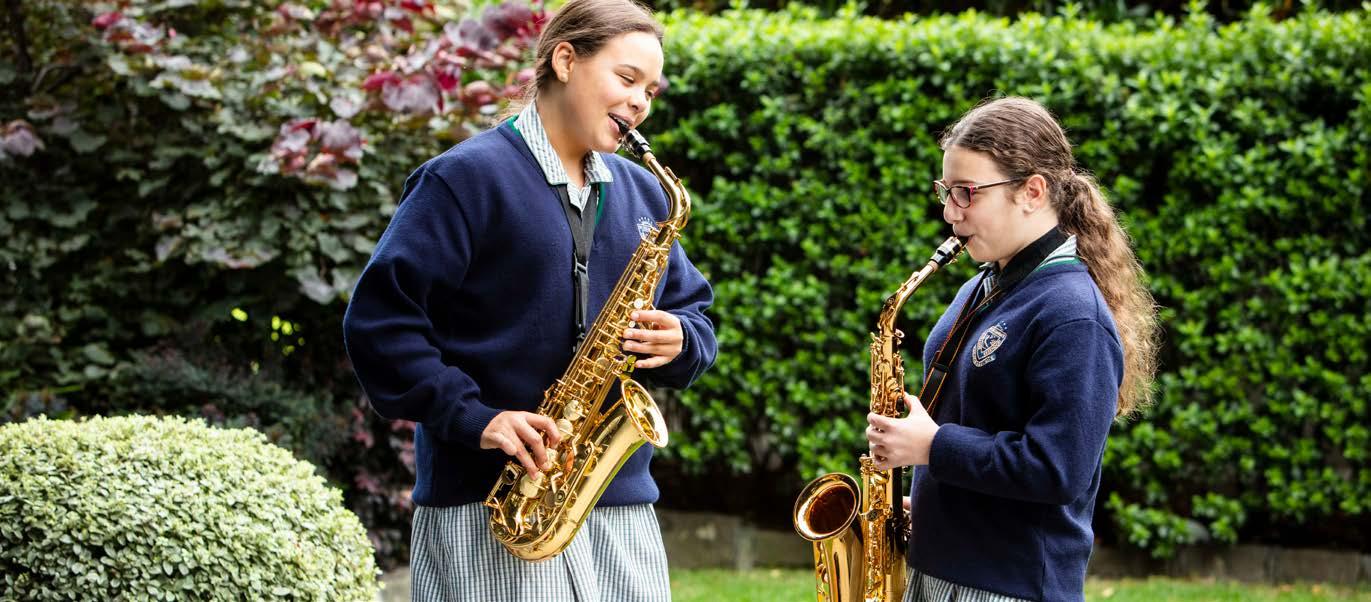
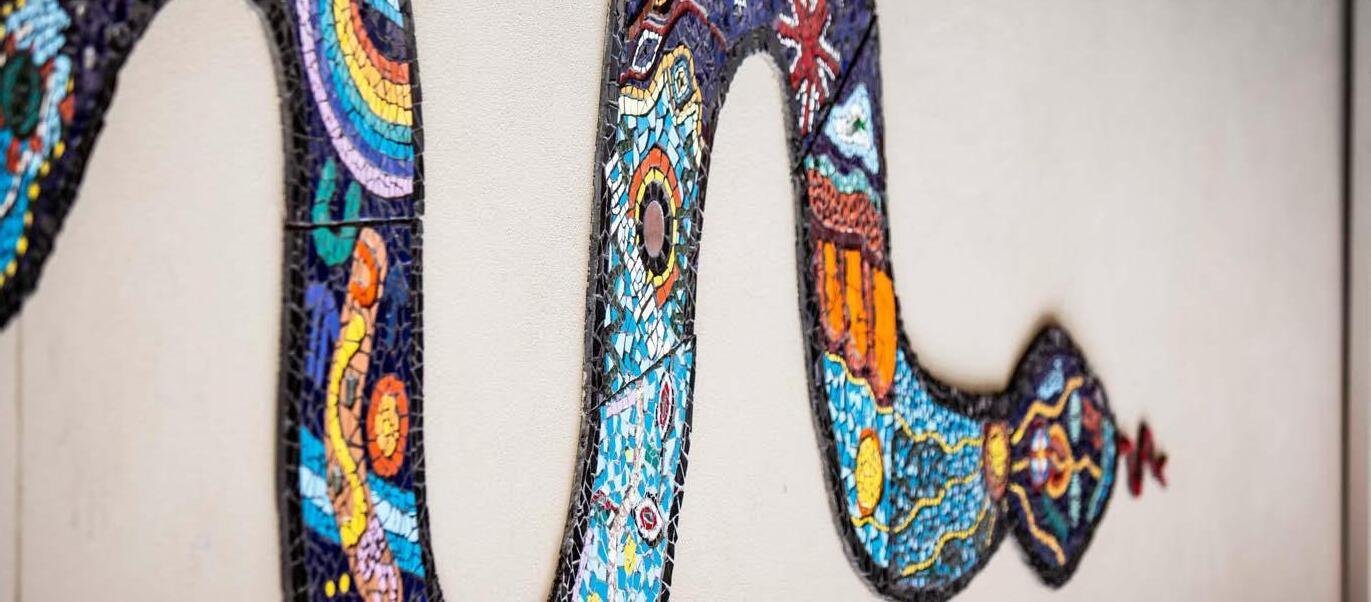
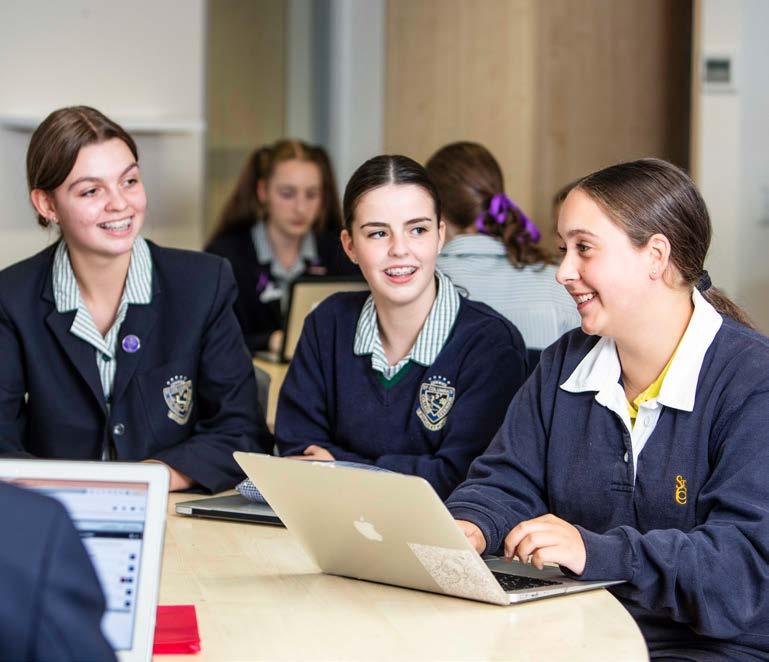
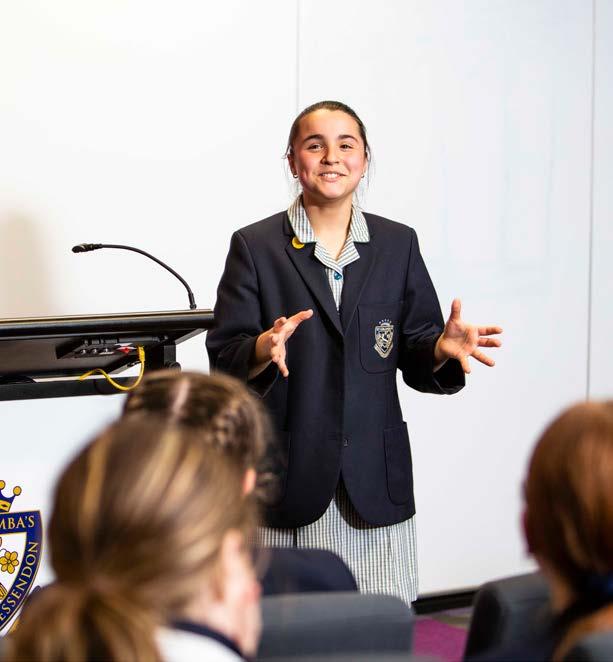
One
of the most recognisable features of any school is the uniform worn by its students while on campus and in wider public forums. The St Columba’s College uniform and the way it is worn provides a statement about the way we perceive ourselves, and the way in which we hope members of the public will perceive us.
All students share in the responsibility to maintain the College’s reputation by wearing the uniform correctly during school hours, while travelling to and from school and on all occasions when representing the College (including excursions).
St Columba’s College has a wide variety of Academic Uniform items that can be worn in combination with each other including a dress, skirt, pants, shorts and shirts. The College also has a complete collection of sports uniform pieces. The College requires students to abide by the makeup and jewellery regulations, as outlined in the College’s Uniform and Grooming Expectations Policy, available on SEQTA.
All of the St Columba’s College uniform items (except shoes) can be purchased from:
Noone Imagewear
537 - 545 Keilor Rd, Niddrie Ph: 9379 5037
BACKPACK TIPS
• Carry the backpack over both shoulders, using the straps to spread the weight
• Put the heavier books and items in the closest compartment to your back
• Clean out your backpack each week to ensure that only the necessary items are carried THE COLLEGE UNIFORM
During transition, students are given a tour of the school. Older students and staff are always available to help them find their way, and students are encouraged to seek guidance when needed.
Students are required to attend their House Group three mornings a week before lessons. Their House Group room remains the same for Years 7–9, with a change occurring in Years 10-12. During House Group, the day begins with a prayer, the daily notices, and roll marking by the House Group Teacher.
• While punctuality is important, so is safety. Students are encouraged to create a list of items needed for each class and display it next to a timetable with room numbers. This helps them prepare for each lesson and know where to go next. They should only carry what is needed until the next break, as lockers can be accessed between lessons. GETTING AROUND
Here are some helpful tips to assist students in getting to class on time:
• Classroom numbers begin with the number of the floor they are on. For example, room 101 is on the first floor, and room 201 is on the second floor. The letter at the start of the room number refers to the building in which the room is located. For example, S101 indicates Slater building, level 1, room 01.
• Visual landmarks can help students remember directions.
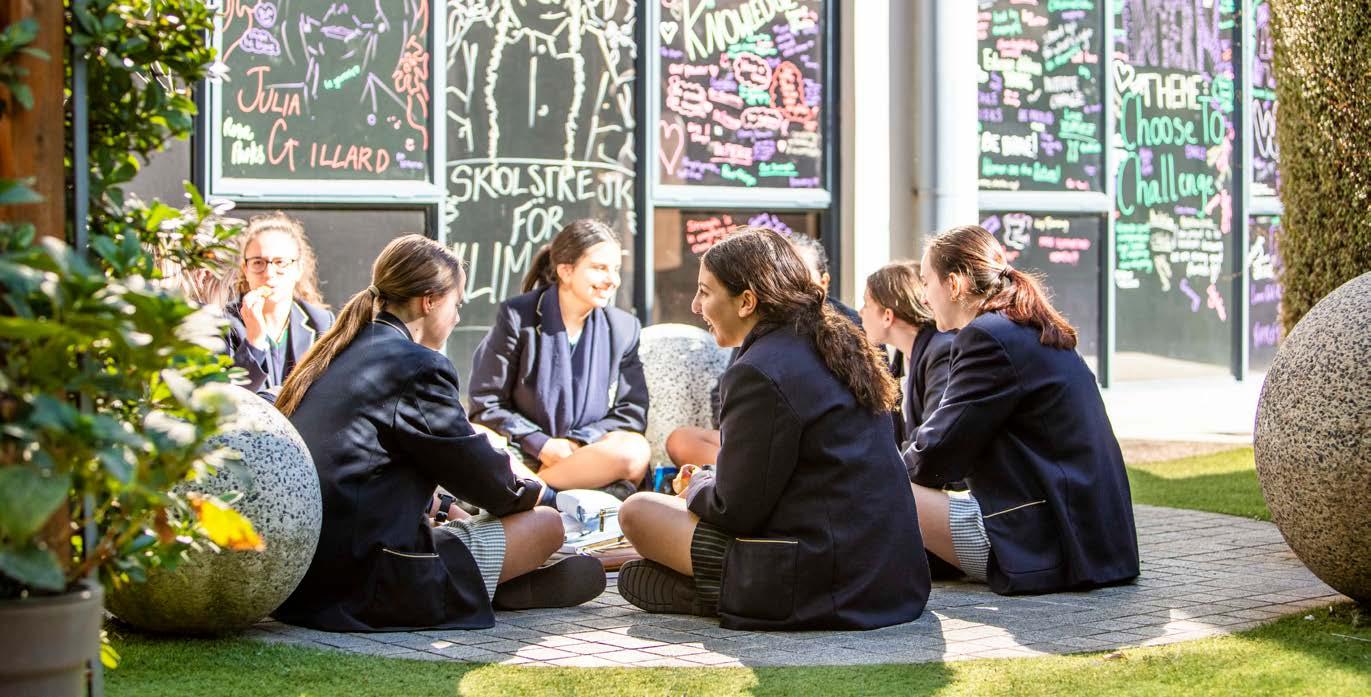
St Columba’s College acknowledges the benefits of e-learning in enhancing curriculum delivery, improving student learning outcomes, and supporting the development of valuable 21st-century skills that will serve students well throughout their lives and future careers.
Students use laptop technology within a wireless environment at the College, enabling them to learn at their own pace and ability level. This approach enhances classroom experiences by supporting personalised learning opportunities. In addition to their own laptops, students may also have access to College-owned mobile technology, such as iPads, when required for class activities and as determined by their teacher. As with textbooks, students are expected to take care of their laptops and use them appropriately and when directed.
Information about Digital Citizenship expectations is provided via SEQTA Learn. These expectations outline the responsible use of technology and the College’s network while at school, and students are encouraged to familiarise themselves with this information.
HELP DESK SUPPORT
The College provides an onsite Help Desk to assist both students and staff. If a student experiences issues with their laptop or network connection, they may seek support in person at the Help Desk office or contact the team via email at: helpdesk@columba.vic.edu.au.
LAPTOP AGREEMENT
Prior to commencing at St Columba’s College, families will receive the College’s Laptop Purchase and Agreement Handbook. This document outlines key information regarding the purchase, use, and maintenance of student laptops. It is important that both students and parents/ carers review this information carefully. A digital copy is available via SEQTA Engage.
MOBILE PHONE POLICY
If students bring a mobile phone to school, it must be stored in their locker between 8:35 am and 3:00 pm. Students are not permitted to access the College network via personal mobile devices and may not use mobile phones during the school day unless under direct teacher instruction. Inappropriate use of mobile phones will result in consequences, in accordance with the College’s Mobile Phone Policy. Further information is available via SEQTA Learn.
When students start at St Columba’s College, they are assigned a numbered locker to store their belongings. Each student is allocated their own locker. It is recommended that students make a note of their locker number and location, for example, “next to
the door”
or
“third from the left.”
On their first day, students are also provided with a lock and can set their own unique combination. They are reminded not to share this combination with anyone, including friends. If a student forgets their combination, they can speak to their House Leader for assistance.
It is completely normal if students find it difficult to open their lock on the first attempt, especially if it is their first time using a combination lock. They are encouraged to keep practising.
It is important that students use their lock to secure their locker at all times.
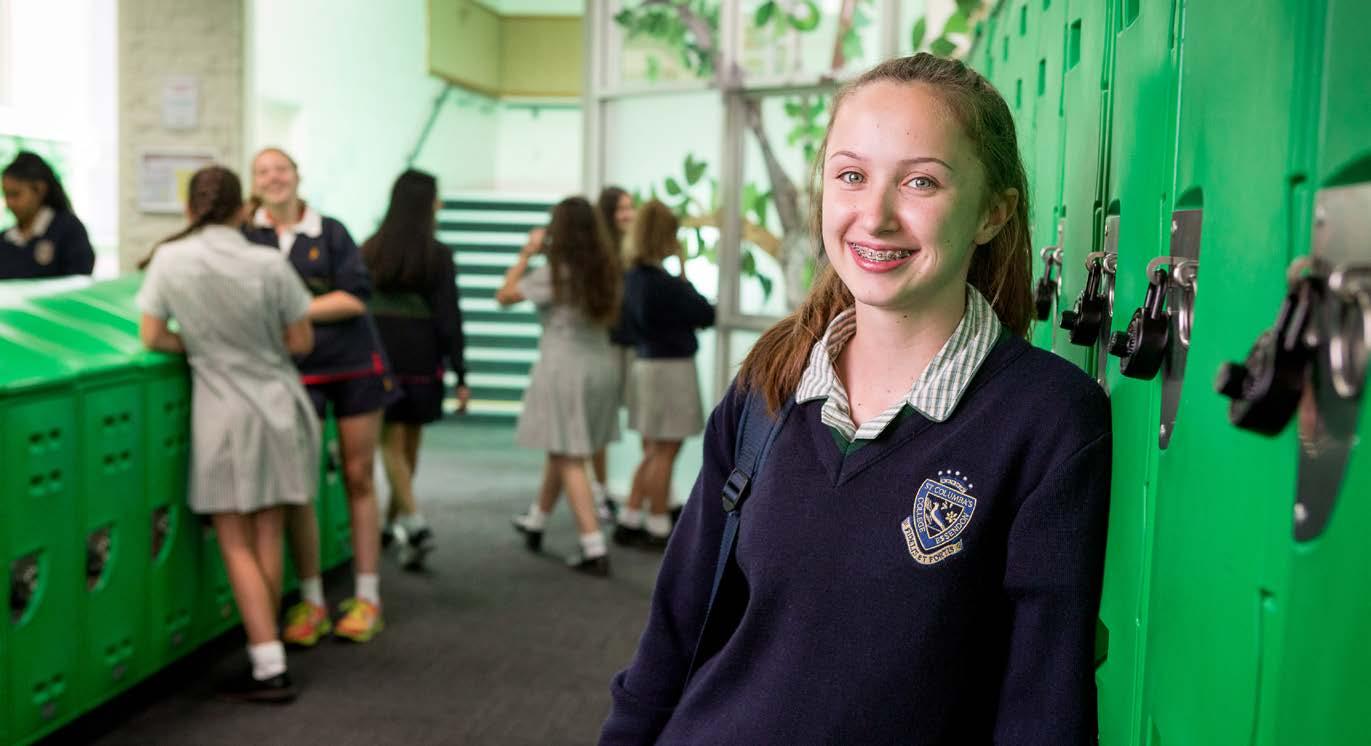
LESSON AND SUBJECT
LESSON INFORMATION
Students at St Columba’s College follow a two-week timetable cycle, meaning their lessons occur on different days and at different times depending on the week.
Classroom locations may occasionally change due to lesson-specific activities. For example, a class might be held in the theatrette for a film viewing or in the STEAM Lab for a handson learning activity. These changes are usually posted outside the usual classroom and included in the daily student bulletin.
Students are expected to bring the correct materials to every lesson—this includes their laptop, textbooks, stationery, and workbooks. If materials are taken home, students should ensure everything is packed back into their College backpack each evening so it is ready for the next school day.
By arriving prepared and ready to learn, students can make the most of every lesson and maximise their time at school.
SUBJECT INFORMATION
Many subjects will be familiar to students from primary school; however, secondary school provides the opportunity to explore these areas in greater depth, including Music, Art, and Science.
RELIGIOUS EDUCATION
Throughout their time at St Columba’s, students study Religious Education through a number of core curriculum areas. Religious Education is a compulsory subject from Year 7 to Year 12. These include the importance of the Scriptures, the teachings and values of the Church, the connection between the Church and the wider community, and topics such as Morality and Justice.
In Year 7, the focus includes the heritage of St Columba’s College, with specific exploration of Mary Aikenhead and the Sisters of Charity, the Liturgical Year, the Stewardship of Creation, and the Power of Story.
These areas are explored through engaging and creative activities, helping students deepen their understanding of the College’s Catholic faith, mission and values—as well as their own personal faith journey.
ENGLISH
In secondary school, students focus more deeply on the stages of writing— brainstorming, drafting, editing, and revising—as they produce increasingly sophisticated reports and essays. These written tasks are based on a variety of text types, including opinion pieces, novels, films, and plays.
MATHEMATICS
Students build on the maths skills they developed in primary school, tackling more challenging problems and equations. Word problems become more complex, and students are introduced to concepts such as algebra.
SCIENCE
Students will engage in more experiments than ever before, exploring topics such as chemical reactions and micro-organisms. Their understanding of the natural world will expand, including fascinating studies of fossils, natural resources, and the environment.
PHYSICAL EDUCATION AND HEALTH
The Physical Education and Health curriculum includes both practical and theoretical components. Students participate in a wide range of activities aimed at enhancing physical fitness, teamwork, and enjoyment. In Health classes, they learn how to build and maintain healthy relationships and understand how to take care of their bodies.
LANGUAGES
At St Columba’s College, students study either French, Italian, or Japanese. They not only learn to speak the language, but also gain insight into the associated cultures, histories, and forms of entertainment.
HUMANITIES
In their first year, students explore a wide range of topics within Humanities. These include Australia’s system of government, the Ancient Worlds of Australia, Rome and China, national and international economics and business, and geographical studies.
ELECTIVE PROGRAM
All Year 7 students participate in a 12week taster program covering the electives listed below. Within this elective program, students explore the overarching theme of Sustainability through the lens of the seven Laudato Si’ Goals and the 17 United Nations Sustainable Development Goals (SDGs). These goals provide a framework for urgent and ongoing action to care for our common home now and into the future.
ART
In Art classes, students are introduced to a variety of mediums including drawing, painting, photography, graphic design, and sculpting techniques. They have access to sophisticated materials and are encouraged to explore and express their ideas with greater creative freedom.
PERFORMING ARTS
As part of the Performing Arts program, Year 7 students engage in Dance, Drama, and Music. In Dance, they learn to communicate through movement and choreograph their own pieces—hence the nickname, “silent poetry.” In Drama, students work on comedic timing and experiment with the art of playmaking. In Music, students are taught to play an instrument, developing their skills in small groups and applying them during weekly Band or Orchestra rehearsals. At the end of each semester, students showcase their work in a live performance at the Junior Performing Arts Concert.
DESIGN TECHNOLOGIES
In Year 7, students study both Design Technologies – Food and Design Technologies – Materials.
In Design Technologies – Food, students learn about food safety, hygiene, and food preparation processes. They investigate the environmental impact of food waste and learn to plan, prepare, and cook healthy, nutritious meals. Working in small groups, they follow the design process to create a ‘Use It Up’ recipe and present their research findings.
In Design Technologies – Materials, students use a design brief to explore the properties and characteristics of various materials. With growing independence, they apply creativity, innovation, and enterprise skills to design solutions to real-world problems affecting individuals and the community.
DIGITAL TECHNOLOGIES
Design, Code and Create is a Digital Technologies subject designed to help students explore how digital tools can enhance learning. By the end of the program, students develop a deeper understanding of coding and computer networks, building confidence in using modern digital tools and resources to support and transform their learning.
Currently, a school day at St Columba’s College is structured with four 75-minute lessons, with the day starting at 8.35am and finishing at 3.00pm. Three times per week each day will begin with House Group. For exact lesson and break times, please see SEQTA Learn.
COLLEGE TIMETABLE
Students are provided with a personal timetable in Semester 1 and Semester 2. There are four lessons each day, operating over a ten-day cycle (beginning with Day 1 in Week 1 and Day 6 in Week 2). Some subjects may run for only one semester. The timetable outlines the lesson, teacher, and classroom location.
It is recommended that students and their parents/carers familiarise themselves with the timetable and identify the days when the student may require their PE uniform or other specialised equipment.
A copy of each student’s timetable can also be accessed via SEQTA Engage under the Timetable tab. Details such as the lesson name, start and finish times, location, and teacher will all be listed in the student’s timetable.
Below is an example to assist with reading a St Columba’s College student timetable:
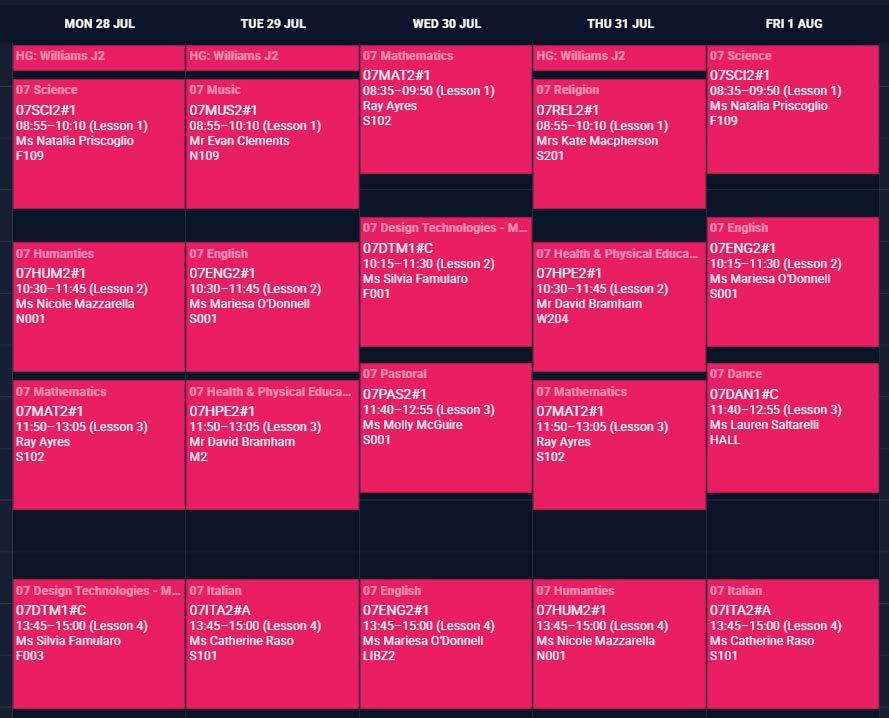
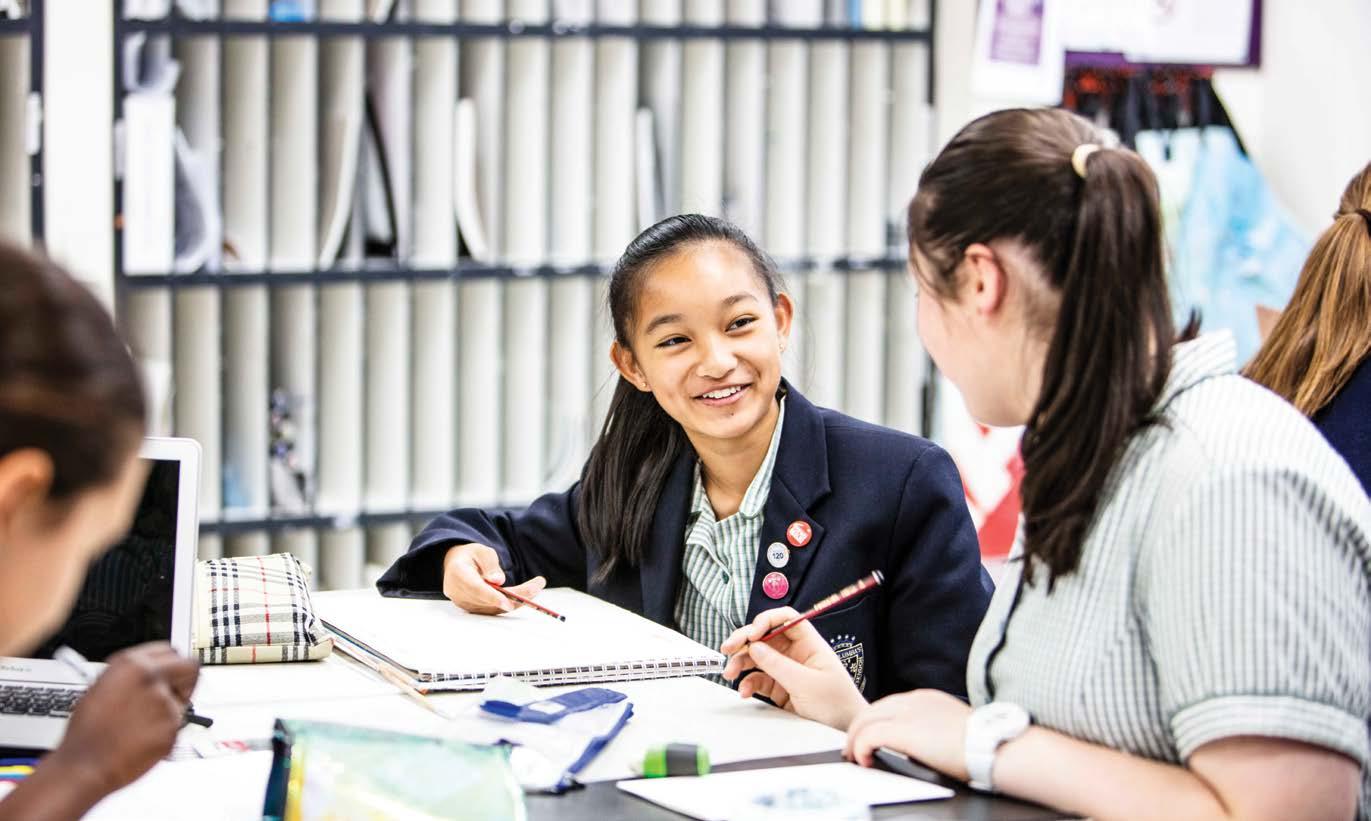
HOMEWORK
At St Columba’s College, there are three basic types of homework that teachers assign to students. These are:
PREPARATION HOMEWORK
Teachers assign reading, research, or tasks such as collecting examples to help students prepare for upcoming class discussions or activities. While completing this type of homework, students are encouraged to note anything they find confusing or to jot down questions to ask during class. Completing preparation homework is essential for active participation and staying on track—especially in classes where participation is assessed.
PRACTICE HOMEWORK
After students are introduced to a new topic or concept, teachers assign practice tasks to reinforce learning. These tasks may include activities such as creative writing or solving mathematical equations. The more students engage with these exercises, the stronger their understanding of the subject becomes.
PERFORMANCE HOMEWORK
Once students have had the chance to practise, teachers may assign performancebased tasks that allow them to demonstrate their understanding. This may include studying for a test, writing an essay, or presenting a group report. Being wellprepared and having practised ensures that students can confidently perform and succeed in these tasks.
Much like preparation homework, revision is an important tool that helps students consolidate and retain what they have previously learned.
Here are some helpful tips for students to revise effectively:
• Get organised. Students can use colour-coding and folders to separate key information, highlighting the most important content.
• Keep revision sessions short, spending too long on a single topic can lead to feeling overwhelmed.
• Identify which revision method works best for the individual. Some students may retain more information by using highlighters, while others might benefit from being quizzed by someone else. Many students find mind-maps, charts, diagrams or illustrations helpful tools for memory and understanding.
Revising is a powerful strategy that enables students to focus on essential information and improve their long-term retention.
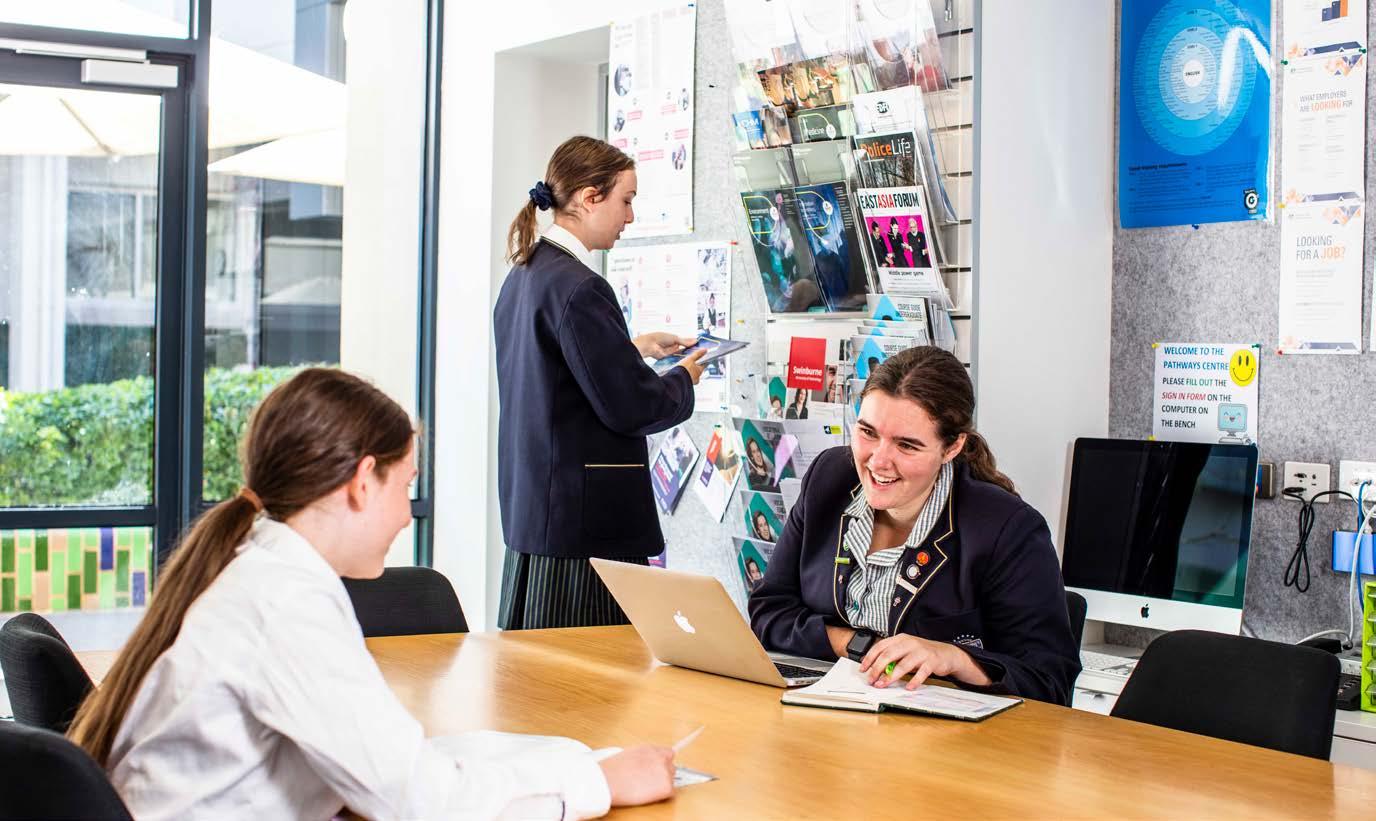

ASSESSMENTS AND STUDY
ASSESSMENTS
In addition to tasks that may be assigned as homework, students at St Columba’s College are assessed in a variety of other ways. These include:
• Tests with multiple choice, short answer, and long answer questions
• Essays and reports
• Written responses completed during class time
• Oral presentations
• Exams (commencing from Year 9)
Students are given ample notice ahead of assessment dates, allowing time to practise and revise what they’ve learned. Assessments are not only a way to demonstrate knowledge but also a helpful tool to identify areas where further understanding or support is needed.
DEVELOPING GOOD STUDY HABITS
Study becomes a significant part of learning in secondary school. Here are some helpful tips for students to develop strong study habits:
• Identify the learning approach that suits them best.
• Set study goals and deadlines to determine what to focus on and for how long.
• Establish a dedicated study space at home that’s free from distractions.
• Join or form a study group to review material, test one another, compare notes, and complete assignments more efficiently.
• Make study a regular part of the routine, eventually, it will become a habit.
CO-CURRICULAR ACTIVITIES
At St Columba’s, students have many opportunities to participate in activities beyond the classroom.
There are curriculum-based co-curricular options such as the debate team, book club, Italian poetry, and Mathematics and Science competitions.
For those who enjoy athletic pursuits, co-curricular sports such as basketball, tennis, and swimming are offered throughout the year.
Students can also engage with the wider community by participating in justice programs and related events.
Information about co-curricular activities is promoted through the daily student bulletin throughout the year.
BRONNTANAIS
Ó DHIA PROGRAM
Students who immerse themselves in the full life of St Columba’s College have the opportunity to apply for embroidered badges through the Bronntanais ó Dhia Program. The activities and events recognised under this program align with the three pillars of the College’s Learning, Teaching & Wellbeing Framework: Engage, Connect, and Learn.
Once a student’s application is approved, they are acknowledged at a College Assembly. They may then choose to have their badge embroidered onto their blazer pocket through the College uniform shop for a small cost.
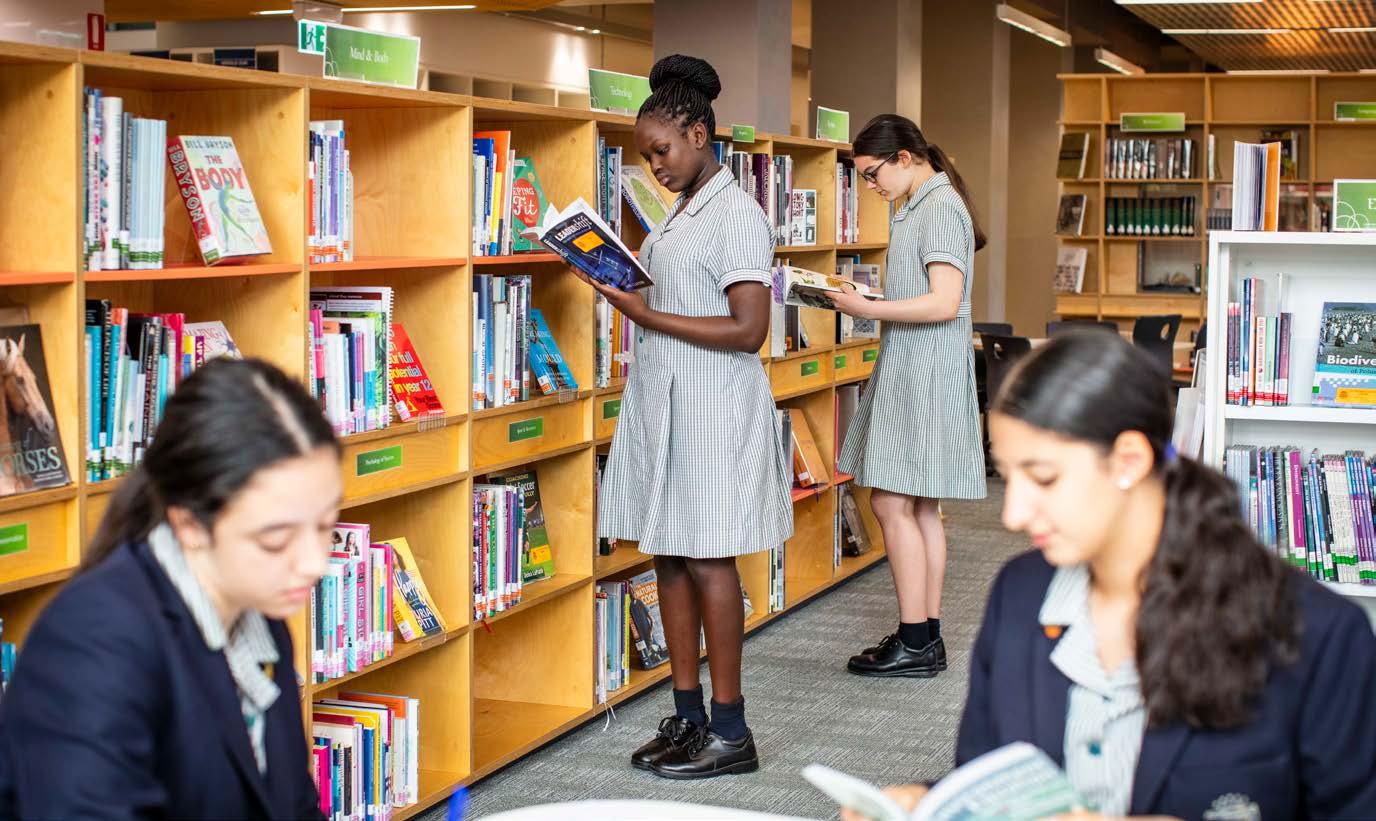
The Sophia Library is a vibrant communal space at St Columba’s College. Filled with academic resources and a variety of learning areas, it provides students with the opportunity to study quietly, collaborate on group work, or simply relax with a book.
The Library is open before and after school, offering students a welcoming environment outside the classroom. It also hosts tutoring sessions throughout the week, which students are encouraged to attend if they require support with their learning or study. HUNGRY
The Hungry Souls Hub is located on the ground floor outside the Foxford Innovation Centre. It is open before school, as well as during recess and lunch, and offers a wide variety of food options for students to choose from.
Students can purchase food and drinks during opening hours (not during class time) or place a lunch order at the beginning of the day. Parents also have the option to order and pay for lunch online, and can top up their child’s student card for use at the Foodstore.
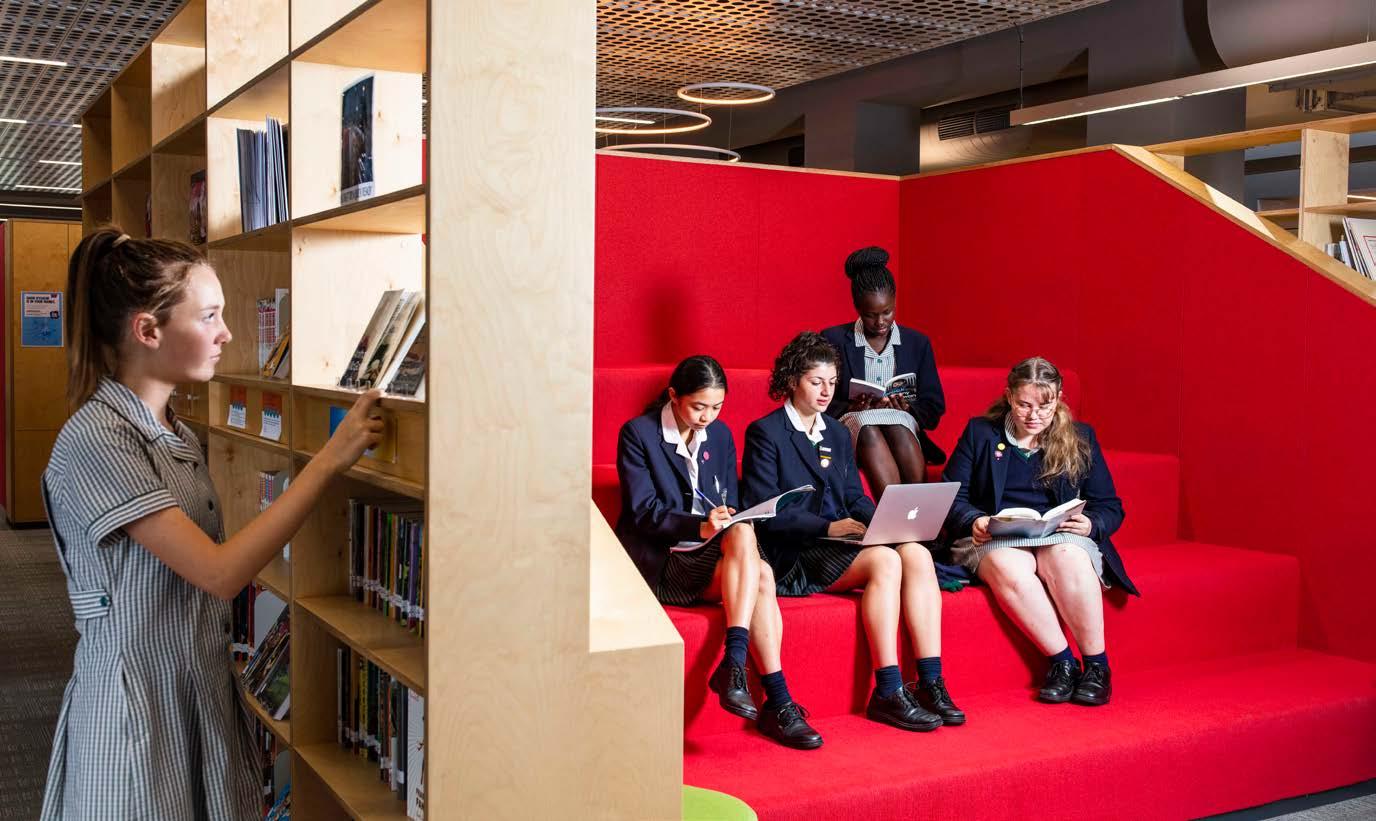
– relevant procedures and policies. COLLEGE COMMUNICATIONS
St Columba’s College uses a variety of platforms to communicate with students. It is important that students familiarise themselves with each of these, to ensure they don’t miss any important information.
SEQTA LEARN
SEQTA Learn is the College intranet and serves as the central hub for essential information for students. Through SEQTA Learn, students can access:
• Direqt Messages
• Timetables
• Bell times
• Student Bulletin
• College calendar
• Policies and guides
• Hungry Souls Hub information
• Classroom changes
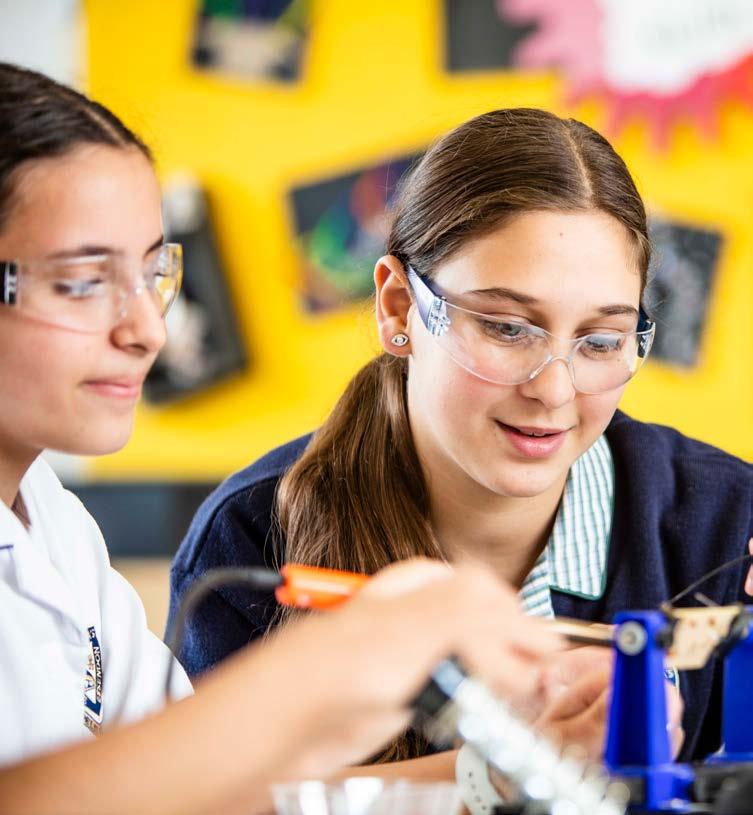
SEQTA ENGAGE
SEQTA Engage is the parent section of the College intranet and serves as the central hub for essential information for parents. Through SEQTA Engage, parents can access:
• Direqt Message
• The College calendar
• Information related to your child’s l earning, including:
– timetables
– attendance summary
– academic reports
– learning task information, including upcoming tasks, corrected tasks and feedback via rubrics
– general information including student and subject handbooks
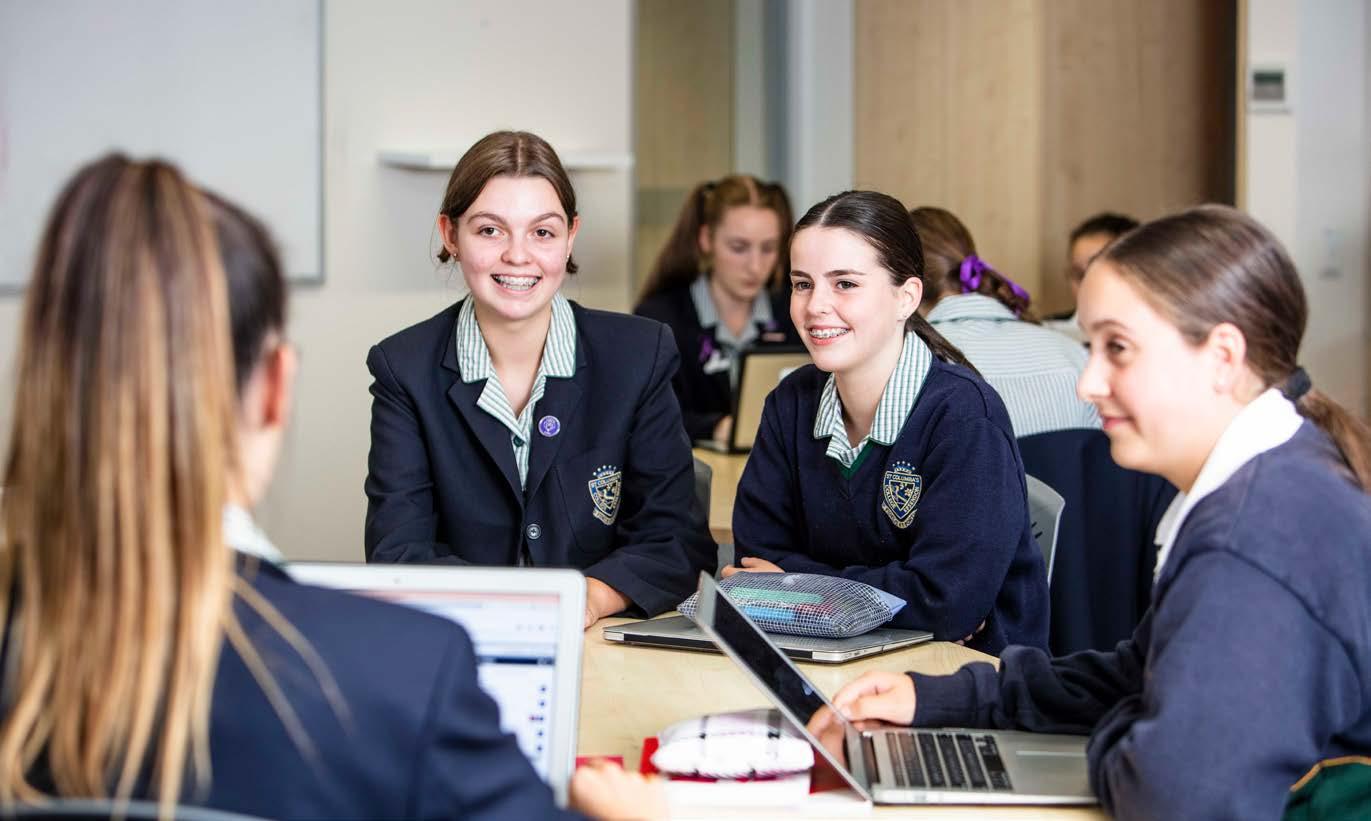
DIREQT MESSAGE FOR STUDENTS
Direqt Message (DM) is the primary method of communication between teachers and students. Students are expected to check their DMs regularly to ensure they stay informed and don’t miss important updates or instructions.
DIREQT MESSAGE, SMS AND EMAILS FOR PARENTS
The College uses Direqt Message (DM), SMS, and occasionally email to communicate important information to parents and carers. An automated SMS system is connected to the nominated mobile number and is used in specific situations such as evacuation or lockdown drills. SMS notifications are also sent in cases of unexplained student absence.
IONA NEWSLETTER
The College newsletter, IONA, is distributed fortnightly via email to parents and is also available on the College website. It includes information about events, curriculum updates, student voice, and messages from College Leadership.
SOCIAL MEDIA
St Columba’s College maintains active social media accounts on Facebook, Instagram, and LinkedIn. These platforms showcase student learning, experiences, and achievements. Students who are permitted to use social media and parents are encouraged to follow the College and engage with the wider school community.
COLLEGE WEBSITE
The College website provides general information about events, curriculum, contact details, and access to the IONA newsletter. SEQTA can also be accessed via the website.
CONSENT2GO
Consent2Go is the platform used by St Columba’s College for updating and uploading students’ medical and emergency information, as well as for approving permission forms.
WHAT DO I DO IF?
IF A STUDENT IS SICK AT SCHOOL
If a student becomes sick or injured while at school, they should speak to their teacher for permission to go to the sickbay. The sickbay operates from 8:30am to 3:00pm each day. The College Nurse will assess and assist the student, after which they will either return to class or be sent home. If a student needs to go home, the College Nurse or Student Receptionist will contact an emergency contact or parent/carer to arrange collection. Students are not permitted to leave the College on their own if they are unwell, regardless of their age or year level.
IF A STUDENT IS ABSENT
If a student is absent from school, their parent or carer must notify the College by logging the absence in SEQTA Engage using the absences tab. A reason for the absence must be included in the information box.
IF A STUDENT IS LATE OR NEEDS TO LEAVE EARLY
Students who arrive late or need to leave early must report to Student Reception to sign in or out and collect a late or leave pass. Parents must notify the College of any lateness by entering an Absence notification on SEQTA Engage. Students in Years 7–10 must be collected by a parent or carer if leaving early. If returning to school after an appointment, students must sign in again at Student Reception.
IF A STUDENT WEARS THE WRONG UNIFORM
If a student arrives at school in the incorrect uniform, their parent or carer must send a Direqt Message (DM) to the student’s House Group Teacher and House Leader explaining the reason. Depending on the circumstances, the student may receive a consequence (including being sent home to rectify the uniform issue) or be issued a uniform pass for the day.
IF A STUDENT NEEDS TO CATCH PUBLIC TRANSPORT TO OR FROM SCHOOL
St Columba’s College is well-serviced by public transport, with bus, train, and tram services all within walking distance. For many students, public transport is the main method of commuting to and from school each day.
IF A STUDENT WANTS TO SEE THE COUNSELLORS
Students who would like to see the College Counsellors can make an appointment by speaking with their House Group Teacher or House Leader, or by emailing the counsellors directly at:
counsellingreferrals@columba.vic.edu.au
HELPFUL TIPS FOR STUDENTS
CATCHING PUBLIC TRANSPORT
If a student will be using public transport to travel to and from St Columba’s College, here are some useful tips for parents and carers:
• • If the student has a smartphone, download public transport apps so they always know what time the bus, train, or tram is arriving, and whether there are any delays.
• • Practise the route to and from school before the first day the student needs to use it. This helps them become familiar with their stop, where the service departs from, and how long the journey should take.
For the safety of all students, families are reminded that the campus is a car-free zone. Parents and carers may drop off and pick up their child in the surrounding streets. Please be mindful of parking limits, restrictions, and students crossing roads.
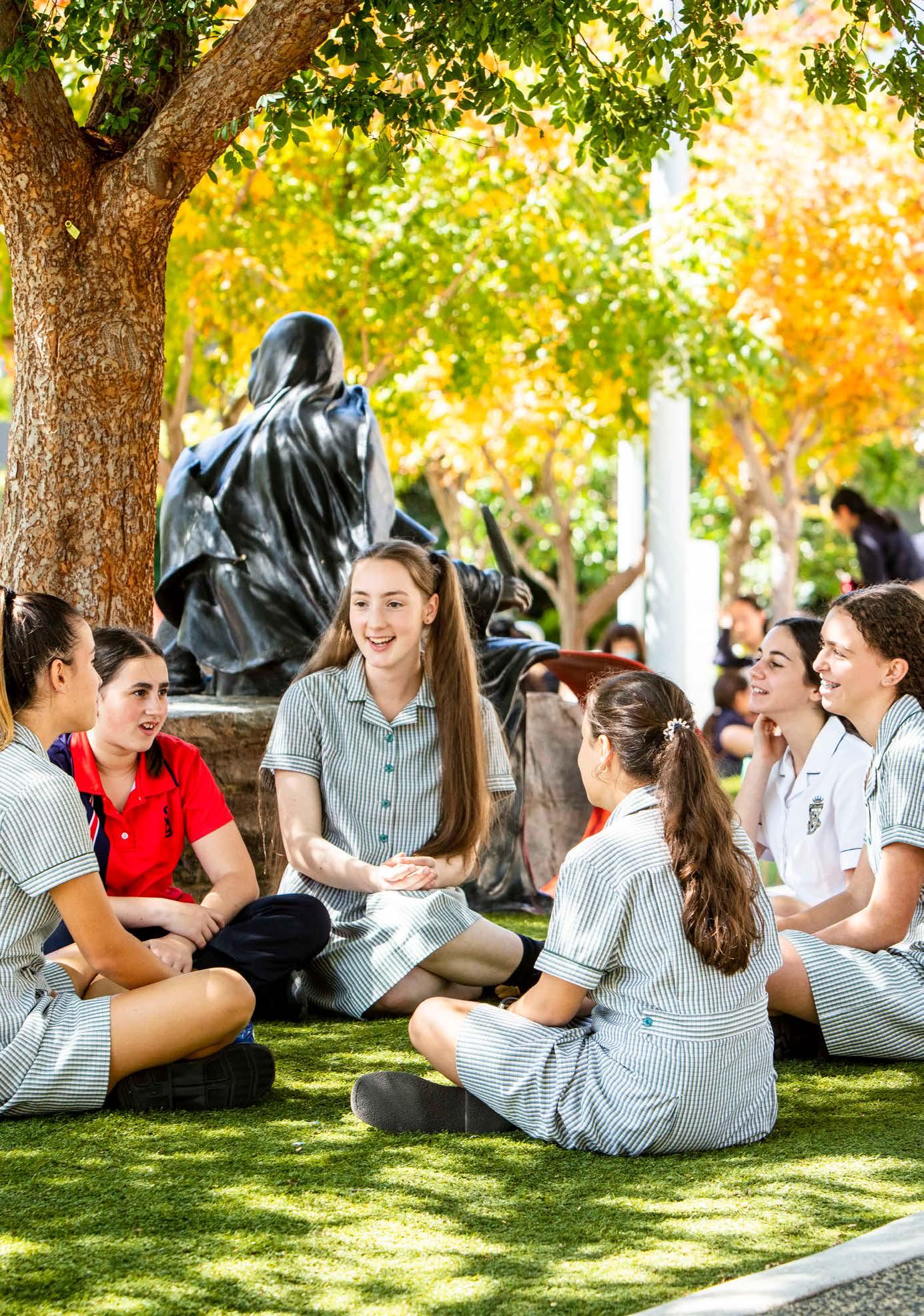
CONTACT US
St Columba’s College 2 Leslie Road (PO Box 89) Essendon VIC 3040
T 03 9337 5311 columba.vic.edu.au
Enrolment Enquiries E registrar@columba.vic.edu.au
General Enquiries E principal@columba.vic.edu.au
UNDER THE STEWARDSHIP OF MARY AIKENHEAD MINISTRIES IN THE TRADITION OF THE SISTERS OF CHARITY
Proudly printed on ‘ecoStar uncoated’ paper to uphold the environmental values of St Columba’s College. This paper is certified carbon neutral and FSC 100% recycled. Print edition July 2025.
